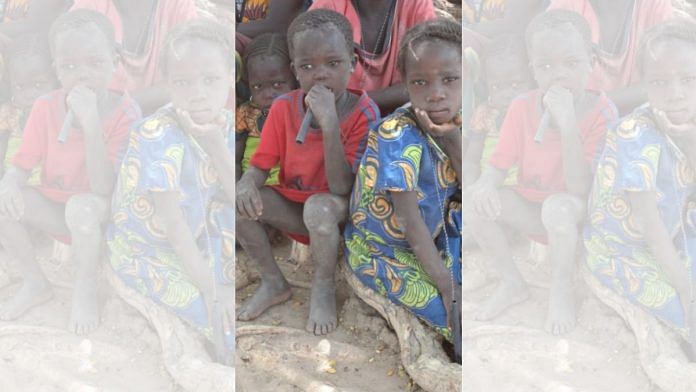New Delhi: With a record low of just 14 cases reported worldwide in the past year, Guinea-worm disease (dracunculiasis) may soon become the second ever human disease to be eradicated, and the first to be wiped out without a vaccine.
The Guinea worm is a parasite that spreads in regions where people don’t have access to safe drinking water. The infection doesn’t cause any symptoms at first — but a year later, the worm will try to make its way out of the body, usually through painful blisters on the feet. The parasite can be pulled out a few centimetres each day, and the entire process usually takes weeks.
When the global Guinea Worm Eradication Program kicked off in 1986, about 3.5 million (35 lakh) human cases occurred annually in 21 countries in Africa and Asia. But the following decades saw the disease eliminated in most of the world. To date, the World Health Organization has certified 199 countries as being free of Guinea worm, including India in February 2000.
According to the US-based non-profit Carter Center, which runs the eradication campaign, the 14 cases last year mark a 48 per cent decline from the 27 cases reported in 2020.
These 14 cases were from just four countries — Chad, Ethiopia, Mali, and South Sudan — which brings the disease very close to being completely wiped out.
Angola and Cameroon, which each had one human case in 2020, had none in 2021.
Guinea worm infections in animals are also a concern, as these contribute to the spread of the disease in humans. Both humans and animals are infected by worms of the same species (Dracunculus medinensis). Therefore, eradication requires stopping infections in both.
According to the Carter Center, infections in animals fell by 45 per cent in 2021.
However, the final stages of completely eradicating a disease are often the most challenging, as it’s extremely difficult to track down cases occurring in remote areas.
Only one human disease has ever been eradicated — smallpox, in 1980. For a disease to be declared eradicated, every country in the world must be certified free of human and animal infection, even countries where transmission has never taken place.
Also read: Tougher than smallpox, but more feasible than polio — study pushes for eradicating Covid
Progress in remaining countries
In 2021, seven human cases of Guinea-worm disease were reported in Chad — a 42 per cent reduction from 12 the previous year. Four were reported in South Sudan, two in Mali, and one in Ethiopia.
“Chad’s Ministry of Health made significant strides against both human and animal cases in 2021,” Adam Weiss, director of the Carter Center Guinea Worm Eradication Program, said in a statement.
“Everyone in Chad, from the national leadership to the village volunteer, has shown a strong commitment to carrying out the interventions and protecting everyone against this disease,” Weiss said.
As for animals, Chad reported Guinea worm infections in 790 domestic dogs and 65 domestic cats. Cameroon reported 10 infected dogs along its border with an area in Chad where the disease is endemic, and Mali reported 16 infected dogs and one cat. Ethiopia reported two infected dogs and one cat.
Ethiopia found no infected baboons in 2021, compared to four in 2020.
Community-based interventions
According to the Carter Center, people in endemic countries have helped by reporting thousands of possible Guinea worm cases. Health workers promptly investigated all such rumours, which are key to finding actual cases and infections.
There is no vaccine or medicine against the parasitic worm. Instead, the disease is being eradicated largely through community-based interventions to educate people and change their behaviour.
For example, apart from drinking from contaminated, stagnant water sources, Guinea worm also spreads from undercooked fish entrails. Fisherfolk, sellers, and consumers have been encouraged to burn or bury discarded entrails, in order to keep dogs from consuming the Guinea worm-contaminated water fleas that the entrails might contain.
Other interventions to stop transmission include community-based health education, using filtered straws for all drinking water, keeping people and animals with emerging Guinea worms from entering water sources, and targeted use of a larvicide in stagnant water sources.
To boost surveillance, all national programmes offer cash rewards for those reporting potential cases in humans and animals.
(Edited by Rohan Manoj)
Also read: These forgotten women played a huge role in eradicating smallpox from India



